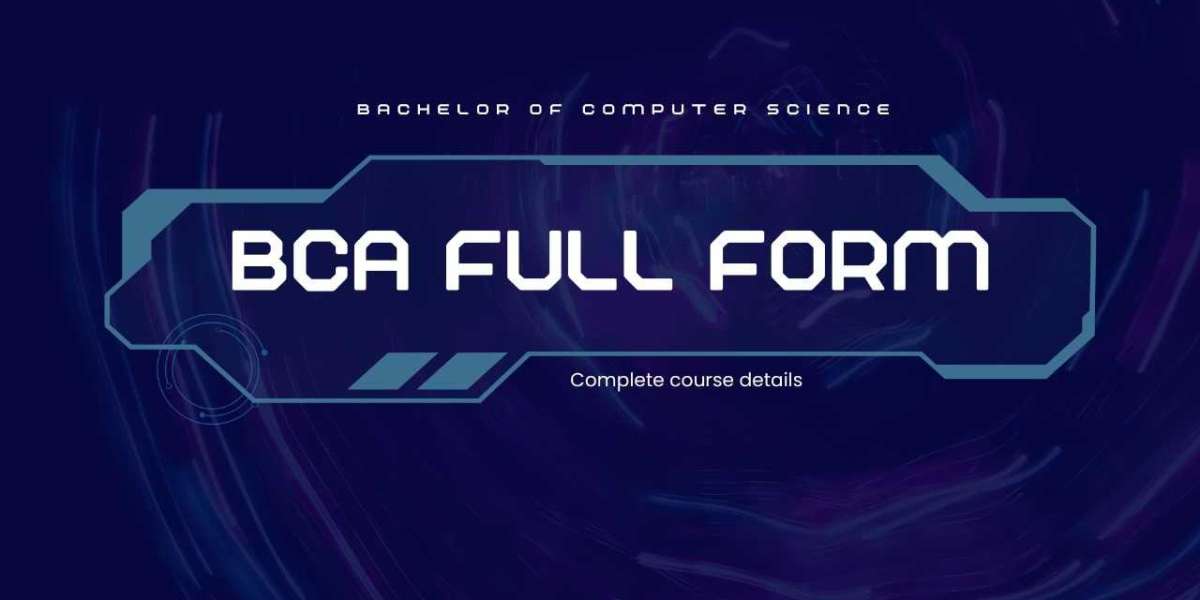Choosing the right undergraduate degree is one of the most important decisions in a student's life. Today’s world is highly digitalized, with technology being an integral part of every industry. For students passionate about technology and problem-solving, pursuing a Bachelor’s in Computer Applications (BCA) can be the perfect choice. With a blend of computer science knowledge, programming skills, and practical learning, BCA provides a robust foundation for students aspiring to make a mark in IT and tech fields.
In this article, we’ll cover everything about BCA, including its full form, the course structure, career opportunities, skillset, and why it is one of the most sought-after undergraduate courses among students interested in computers and technology.
What is the BCA Full Form?
The full form of BCA is Bachelor’s in Computer Applications. It is an undergraduate degree that primarily focuses on providing students with foundational knowledge in computer science, programming, system analysis, software development, and technology-based problem-solving. This degree offers a strong combination of theoretical knowledge and practical skills, preparing students for careers in the IT and technology sector.
BCA is equivalent to a bachelor's degree in Computer Science but with a more application-oriented curriculum. It is ideal for students with a knack for learning how computers and technology impact business and problem-solving across industries.
Why Choose BCA?
There are several reasons students choose BCA as their undergraduate course. Let’s break it down:
Growing Demand in the IT Sector: The IT industry is expanding rapidly, and businesses rely heavily on computer applications to streamline their operations. Choosing BCA prepares students for lucrative opportunities in industries such as software development, IT consultancy, data analysis, network security, and more.
Hands-On Skills Development: Unlike purely theoretical courses, the BCA curriculum is practical and skill-based, emphasizing programming, coding, system design, and IT problem-solving. This equips students with market-ready skills.
Foundation for Higher Studies: Many students choose BCA as a stepping stone for higher studies. After completing the course, students can opt for courses like MCA (Master of Computer Applications), MBA in IT, or other specialized postgraduate programs.
Wide Range of Career Options: The versatility of a BCA degree allows students to explore diverse career paths. Graduates can work in IT companies, start freelancing, or enter tech-driven roles in various industries.
Affordable Flexible: Compared to many other IT-related undergraduate programs, BCA is an affordable option with flexible program structures at most universities and colleges.
Course Structure of BCA
The BCA program typically spans 3 years and consists of six semesters. The curriculum is designed to ensure students gain both theoretical knowledge and practical application of computer science concepts.
Core Subjects in BCA
Here’s a breakdown of the common subjects in the BCA syllabus:
Semester 1:
- Fundamentals of Computer
- Introduction to Programming (C Language or similar foundational languages)
- Digital Logic Computer Organization
- Basic Mathematics for Computer Applications
Semester 2:
- Object-Oriented Programming
- Data Structure Algorithms
- Operating System Concepts
- Database Management Systems
- Business Communication Skills
Semester 3:
- Programming with Java or Python
- Data Communication Computer Networks
- Software Engineering Concepts
- Computer Graphics
Semester 4:
- Web Technologies Internet Programming
- Advanced Programming (Java/C++/Python)
- Networking Principles
- Principles of Management
Semester 5:
- Mobile Application Development
- Artificial Intelligence
- Cloud Computing
- Software Testing
Semester 6:
- E-commerce Applications
- IT Project Work (Capstone Project)
- Advanced Topics in Networking Cybersecurity
Specializations in BCA
Some institutions allow students to specialize in areas of interest during their final year, such as:
- Cloud Computing
- Data Science
- Mobile Applications Development
- Web Development
- AI Machine Learning
The diverse range of subjects in the BCA curriculum ensures students are equipped with versatile skill sets, allowing them to enter various niches in the IT sector.
Skills You Will Learn During a BCA Program
The BCA program focuses on developing both hard and soft skills essential for the modern workplace. Some of the core skills students acquire include:
Programming Skills: Languages like Java, C, Python, or C++ are introduced, equipping students with versatile coding knowledge.
Problem-Solving Critical Thinking: With an emphasis on computer science principles, BCA enhances logical reasoning and problem-solving abilities.
Teamwork Communication: Many projects during the BCA program require group collaboration, honing leadership and communication skills.
Database Management: Learning about database concepts like SQL and DBMS helps students manage and store data efficiently.
Networking Knowledge: Understanding networks is essential for careers in IT. BCA teaches students the basics of network architecture and cybersecurity.
Web Development: Many BCA programs include training in web technologies, allowing students to develop and maintain websites.
These skills prepare students for both entry-level jobs in the IT industry and advanced studies.
Career Opportunities After BCA
Once you’ve completed the Bachelor’s in Computer Applications, you can explore numerous opportunities in various sectors. Let’s examine the top career paths that students can choose after completing a BCA:
1. Software Developer/Programmer
- BCA graduates can work as software developers, focusing on creating, testing, and deploying applications in industries such as IT companies, e-commerce, or healthcare.
2. System Analyst
- A system analyst analyzes technical requirements and develops solutions for businesses by improving IT infrastructure.
3. Database Administrator
- This role involves overseeing the storage and retrieval of data, ensuring data integrity and security in IT environments.
4. IT Support Specialist
- Providing technical support and solving hardware and software issues for organizations.
5. Web Designer/Web Developer
- BCA equips students with web development and web design knowledge, allowing them to craft websites or maintain e-commerce portals.
6. Cybersecurity Analyst
- With the rise of cybercrime, roles in cybersecurity are in demand. BCA graduates can specialize in this field by pursuing additional certifications.
7. Higher Studies
- After completing BCA, students often pursue higher studies such as MCA (Master in Computer Applications), MBA in IT, or other specialized certifications in emerging fields.
8. Entrepreneurship
- Many graduates take their technical knowledge to start their IT ventures, such as mobile application development, software startups, or consulting firms.
Is BCA the Right Choice for You?
If you love working with computers, enjoy problem-solving, and are passionate about coding, BCA is the ideal course for you. It offers:
- A mix of theoretical and practical knowledge.
- Career stability and opportunities in the booming IT sector.
- A pathway toward higher studies and specialization in computer fields.
- Development of problem-solving, coding, and teamwork skills.
BCA isn’t just a degree; it’s a practical skill-building program that offers hands-on exposure to the real-world IT industry.
Conclusion
BCA, or Bachelor’s in Computer Applications, is an excellent undergraduate choice for students eager to enter the technology and IT sectors. It combines problem-solving, programming, and practical learning to ensure students are future-ready. With an array of opportunities in software development, system analysis, IT support, and further studies, a BCA degree opens doors to a multitude of career paths.
If you’re interested in technology, enjoy coding, or aspire to build a strong foundation in IT, BCA can pave the way for both personal and professional growth. With dedication and the right approach, this program can truly set you on an exciting journey toward a successful career in the IT world.
FAQs
What is the full form of BCA? The full form of BCA is Bachelor's in Computer Applications.
What are the career options after completing a BCA? After BCA, students can pursue roles like software developer, system analyst, database administrator, IT support specialist, cybersecurity analyst, or higher studies like MCA.
Is BCA better than B.Sc. Computer Science? BCA is application-oriented with a focus on programming and IT, while B.Sc. Computer Science is more theoretical. The choice depends on personal preferences.
Can I pursue MCA directly after BCA? Yes, completing BCA makes you eligible to pursue the Master’s in Computer Applications (MCA).
Is BCA difficult for beginners? BCA can be challenging, especially for beginners in programming, but with consistent effort, it is manageable.








